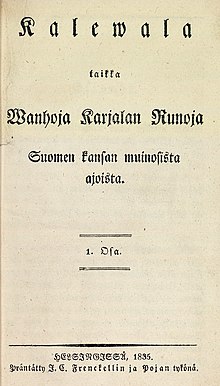The Kalevala

Kalevala The Finnish national epic by Elias Lönnrot. First edition, 1835.
|
|
| Author | Elias Lönnrot |
|---|---|
| Original title | Kalevala |
| Translator | John Addison Porter, John Martin Crawford, William Forsell Kirby, Francis Peabody Magoun, Jr., Eino Friberg & Keith Bosley |
| Country | Grand Duchy of Finland now Republic of Finland |
| Language | Finnish, translated multiple times. |
| Genre | Epic poetry, National epic |
| Publisher | J. C. Frenckellin ja Poika and many others. |
|
Publication date
|
Old Kalevala: 1835 – New Kalevala: 1849 |
|
Published in English
|
1888, 1907, 1963 & 1989 |
| Pages | Old Kalevala: vol 1, 208pp. vol 2, 334pp – New Kalevala: ~500pp |
The Kalevala or The Kalewala (/ˌkɑːləˈvɑːlə/;Finnish: [ˈkɑle̞ʋɑlɑ]) is a 19th-century work of epic poetry compiled by Elias Lönnrot from Karelian and Finnish oral folklore and mythology.
It is regarded as the national epic of Karelia and Finland and is one of the most significant works of Finnish literature. The Kalevala played an instrumental role in the development of the Finnish national identity, the intensification of Finland's language strife and the growing sense of nationality that ultimately led to Finland's independence from Russia in 1917.
The first version of The Kalevala (called The Old Kalevala) was published in 1835. The version most commonly known today was first published in 1849 and consists of 22,795 verses, divided into fifty songs (Finnish: runot). The title can be interpreted as "The Land of Kaleva" or "Kalevia".
Elias Lönnrot (9 April 1802 – 19 March 1884) was a physician, botanist, linguist, and poet. During the time he was compiling the Kalevala he was the district health officer based in Kajaani responsible for the whole Kainuu region in the eastern part of what was then the Grand Duchy of Finland. He was the son of Fredrik Johan Lönnrot, a tailor and Ulrika Lönnrot; he was born in the village of Sammatti, Uusimaa.
...
Wikipedia
